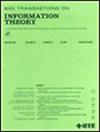任意辅助节点集的ε-MSR码
IF 2.9
3区 计算机科学
Q3 COMPUTER SCIENCE, INFORMATION SYSTEMS
引用次数: 0
摘要
最小存储再生(MSR)码是一类最大距离可分离(MDS)阵列码,能够通过从每个辅助节点下载最小数量的信息来修复任何单个故障节点。然而,MSR码需要大的子分组水平,这阻碍了它们在实际设置中的有用性。这导致了另一类MDS阵列代码$\varepsilon $ -MSR代码的开发,对于这些代码,从每个辅助节点下载的修复信息最多是某些$\varepsilon \gt 0$最小量的$(1+\varepsilon)$的一个因子。$\varepsilon $ -MSR代码相对于MSR代码的优点是它们的子分组级别小。然而,在之前的epsilon-MSR代码结构中,需要几个特定的节点参与故障节点的修复,这限制了这些节点不可用的情况下代码的性能。在这项工作中,我们提出了一个不受此限制的$\varepsilon $ -MSR代码的构造。对于有n个节点的代码,其中k个存储未编码的信息,对于任意数量的d个辅助节点($k\le d\lt n$),可以通过联系d个幸存节点中的任何一组来修复故障节点。我们的构造利用群代数技术,并要求线性场大小。我们还将构造推广到能够使用d个辅助节点修复h个故障节点的MDS数组代码,每个辅助节点的下载速度略低于最优,同时用于所有$h \le n-k$和$k \le d \le n-h$。本文章由计算机程序翻译,如有差异,请以英文原文为准。
ε-MSR Codes for Any Set of Helper Nodes
Minimum storage regenerating (MSR) codes are a class of maximum distance separable (MDS) array codes capable of repairing any single failed node by downloading the minimum amount of information from each of the helper nodes. However, MSR codes require large sub-packetization levels, which hinders their usefulness in practical settings. This led to the development of another class of MDS array codes called $\varepsilon $ -MSR codes, for which the repair information downloaded from each helper node is at most a factor of $(1+\varepsilon)$ from the minimum amount for some $\varepsilon \gt 0$ . The advantage of $\varepsilon $ -MSR codes over MSR codes is their small sub-packetization levels. In previous constructions of epsilon-MSR codes, however, several specific nodes are required to participate in the repair of a failed node, which limits the performance of the code in cases where these nodes are not available. In this work, we present a construction of $\varepsilon $ -MSR codes without this restriction. For a code with n nodes, out of which k store uncoded information, and for any number d of helper nodes ( $k\le d\lt n$ ), the repair of a failed node can be done by contacting any set of d surviving nodes. Our construction utilizes group algebra techniques, and requires linear field size. We also generalize the construction to MDS array codes capable of repairing h failed nodes using d helper nodes with a slightly sub-optimal download from each helper node, for all $h \le n-k$ and $k \le d \le n-h$ simultaneously.
求助全文
通过发布文献求助,成功后即可免费获取论文全文。
去求助
来源期刊

IEEE Transactions on Information Theory
工程技术-工程:电子与电气
CiteScore
5.70
自引率
20.00%
发文量
514
审稿时长
12 months
期刊介绍:
The IEEE Transactions on Information Theory is a journal that publishes theoretical and experimental papers concerned with the transmission, processing, and utilization of information. The boundaries of acceptable subject matter are intentionally not sharply delimited. Rather, it is hoped that as the focus of research activity changes, a flexible policy will permit this Transactions to follow suit. Current appropriate topics are best reflected by recent Tables of Contents; they are summarized in the titles of editorial areas that appear on the inside front cover.
 求助内容:
求助内容: 应助结果提醒方式:
应助结果提醒方式:


